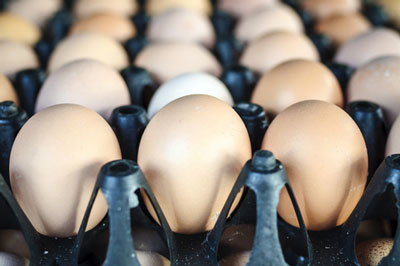Bioplastics made from albumin could be used in antibacterial food packaging
- Like
- Digg
- Del
- Tumblr
- VKontakte
- Buffer
- Love This
- Odnoklassniki
- Meneame
- Blogger
- Amazon
- Yahoo Mail
- Gmail
- AOL
- Newsvine
- HackerNews
- Evernote
- MySpace
- Mail.ru
- Viadeo
- Line
- Comments
- Yummly
- SMS
- Viber
- Telegram
- Subscribe
- Skype
- Facebook Messenger
- Kakao
- LiveJournal
- Yammer
- Edgar
- Fintel
- Mix
- Instapaper
- Copy Link
Posted: 31 March 2015 | Victoria White | No comments yet
Bioplastics made from protein sources such as albumin have shown significant antibacterial properties and could eventually be used in food packaging…


Bioplastics made from protein sources such as albumin and whey have shown significant antibacterial properties.The findings, from a recent study by the University of Georgia College of Family and Consumer Sciences, could eventually lead to their use in plastics used in food packaging.


Researchers tested three non-traditional bioplastic materials—albumin, whey and soy proteins—as alternatives to conventional petroleum-based plastics that pose risks of contamination. In particular, albumin, a protein found in egg whites, demonstrated tremendous antibacterial properties when blended with a traditional plasticiser such as glycerol.
“It was found that it had complete inhibition, as in no bacteria would grow on the plastic once applied,” said Alex Jones, a doctoral student in the department of textiles, merchandising and interiors. “The bacteria wouldn’t be able to live on it.”
Albumin – glycerol was found to be fully biodegradable
One of the researchers’ aims is to find ways to reduce the amount of petroleum used in traditional plastic production; another is to find a fully biodegradable bioplastic.
The albumin-glycerol blended bioplastic met both standards, Jones said. “If you put it in a landfill, this being pure protein, it will break down,” he said. “If you put it in soil for a month—at most two months—these plastics will disappear.”
The next step in the research involves a deeper analysis of the albumin-based bioplastic’s potential for use in the biomedical and food packaging fields.
Researchers are encouraged by the antimicrobial properties of albumin-based bioplastics that could potentially reduce the risk of food contamination by loading bioplastics with drugs and food preservatives that can kill bacteria or prevent it from spreading.
The study, “Protein-based bioplastics and their antibacterial potential,” is published in Journal of Applied Polymer Science.






